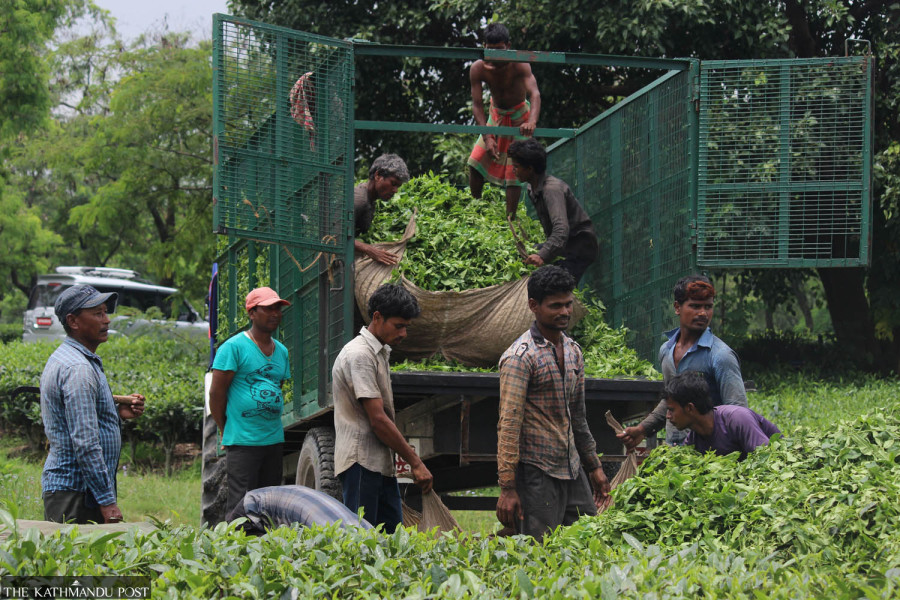Money
Nepali tea exports cause a storm in Darjeeling teacup
Demand to ban Nepali tea grows louder in Darjeeling as Indian traders fear losing market share.
Parbat Portel
A leader of the tea labour union in Darjeeling has asked India’s central government to stop the import of Nepali tea, claiming that it has harmed the Darjeeling tea brand.
For the last few years, the demand to ban or impose an import duty on tea from Nepal has been growing louder in Darjeeling.
Mamata Banerjee, the chief minister of West Bengal, India, visited Darjeeling a week ago and promised to halt the import of tea from Nepal.
Earlier, in June, Santosh Kumar Sarangi, director general of India’s foreign trade, interacting with the Federation of Indian Export Organisations in Kolkata, said that both Darjeeling Tea and Nepal tea should be sold separately. While tea imports from Nepal could not be banned, mixing should be checked, he said.
According to media reports, Sarangi said it was not possible to ban the import of Nepal tea due to geopolitical reasons. “As far as trade with Nepal is concerned, some flexibility is required,” he was quoted as saying on the occasion.
Regarding the mixing of Darjeeling Tea and Nepal tea, there may be some collusion,” he said. A former chairman of the Tea Board, Sarangi, said the board had developed a traceability app for Darjeeling Tea.
Shanta Chhetri, a former Rajya Sabha member, is the latest to raise the issue, demanding a 40 percent import duty on tea from Nepal.
Sunil Rai, joint secretary of the Darjeeling Terai Dooars Chia Kaman Mazdoor Union, during a function in Siliguri demanding a bonus hike for Darjeeling tea labourers, said that Nepali tea sold in the name of Darjeeling tea should be banned.
“Both West Bengal and the central government [of India] should take this initiative.”
The function was organised to demand bonus hikes for Indian tea labourers, but it was centred more on Nepali tea.
Speakers at the function also called for serious testing of the quality of Nepali tea.
“Initially, we raised the issue of restricting Nepali tea. But the government has not paid attention to it. This will complicate the issue more in the future,” said Rai.
In 2016, the Indian tea entrepreneurs and labour union submitted a memorandum to the then-Indian president, Pranav Mukharjee, demanding a ban on Nepali tea.
The government did not take the demand seriously, and as a result Indian tea entrepreneurs and labour unions are still upset, according to reports.
Labour leaders are of the view that Nepali tea has directly impacted Darjeeling tea.
“To protect the tea industry, the central government needs to ban Nepali tea immediately,” said Rai.
Nepali tea is mainly exported to India. According to Rai, an opportunist trade group exports the same tea to third countries with a ‘Darjeeling tea’ label.
“Once Nepali tea is stopped, the demand for Darjeeling tea will increase sharply,” said another labour union leader.
“Or else we are sure that the brand of Darjeeling tea will be tarnished gradually.”
Labour unions believe that both the state and central governments need to take urgent action to protect the pride of the Darjeeling brand in the global market.
Udaya Chapagain, director of Gorkha Tea Estate in Ilam, said that since the topography of Ilam and Darjeeling is similar, Nepali tea closely resembles Darjeeling tea. “This has caused many Indian tea entrepreneurs to fear losing global market share.”
“India has a strategy to limit Nepali tea under different pretexts. For this, the Nepal government needs to pay attention on time.”
In April, trucks laden with tonnes of tea destined for the southern neighbour got stuck at the Panitanki Customs across the Nepal-India border, as India asked its customs authorities to test the quality of Nepali tea bound for India.
The halt came after India’s Commerce Ministry issued a circular to its customs offices to test the quality of all tea imports from Nepal.
In 2005 and 2015, the Commerce Ministry of India had issued a similar circular to its customs to conduct mandatory lab tests on Nepali tea.
Nepali tea samples are tested at the National Food Laboratory, Kolkata, India.
Around 92 percent of Nepal-produced tea that is exported to India goes through the eastern border point, while 6 percent is exported from Biratnagar and 2 percent from Birgunj.
According to the Trade and Export Promotion Center, Nepal exported 13,916 tonnes of tea worth Rs3.62 billion in the last fiscal year that ended in mid-July.
Nepal’s tea exports sharply jumped by 44.3 percent to Rs1.86 billion in the first three months of the current fiscal year, which ended in mid-October.
During the review period, Nepal exported 6,495 tonnes of tea, which accounted for 4.87 percent of the country’s total trade.
Demand for Nepali tea has been rising as the bushes in Darjeeling have aged. Therefore, Nepali traders say the tea leaves have become a valuable input for the factories in and around Darjeeling.
For years, Indian buyers have been alleging that Nepali tea is substandard and, as a result, offer lower prices. Nepali tea is often stopped at different border points under various pretexts.




 13.12°C Kathmandu
13.12°C Kathmandu













